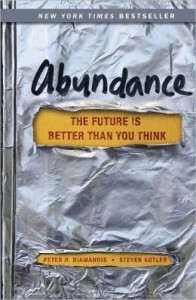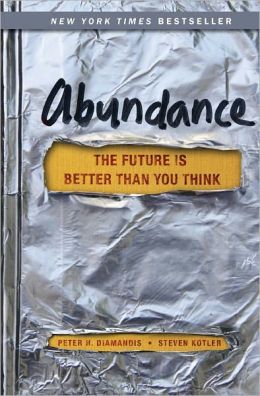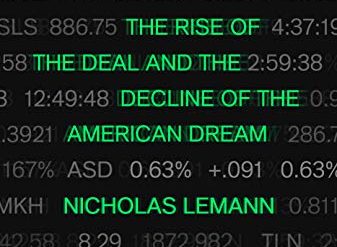
Peter Diamandis envisions a bright future in which humanity triumphs against all its challenges, from climate change, overpopulation, and poverty to the planetary deficits in energy and water.
This is not science fiction. It’s an eye-opening survey of what one celebrated technology visionary perceives as a feasible future for our species.
As Diamandis writes, “Abundance is a tale of good news. At its core, this book examines the hard facts, the science and engineering, the social trends and economic forces that are rapidly transforming our world. . . The point is this: When seen through the lens of technology, few resources are truly scarce; they’re mainly inaccessible. Yet the threat of scarcity still dominates our worldview.”
Abundance: The Future Is Better Than You Think by Peter H. Diamandis and Steven Kotler ★★★★★
Diamandis is unusually well qualified to write this book. He is a Harvard-trained physician and an aeronautical engineer with a master’s degree from MIT. Ever since the age of 8, he has been preoccupied with space exploration. He has founded or co-founded a half-dozen businesses and organizations involved in that field and is widely credited with being the seminal figure in jump-starting the private space exploration business with the $10 million Ansari X Prize that led to the flight of SpaceShipOne.
In Abundance, co-written with Steven Kotler and published February 2012, Diamandis veers far from the course he set in space, settling down to earth to explore how humankind can leverage emerging technologies to confront its most pressing problems. Though Diamandis’ focus is squarely on the exponential growth in speed, capability, and spread of information processing technologies, he is not a gadget freak.
Diamandis recognizes the social and political context in which technology is brought to light, although he may downplay the ferocity of humanity’s innate resistance to change. He writes about “game-changing” technologies, such as the “Lab-on-a-Chip . . . a portable, cell-phone-sized device [that] will allow doctors, nurses, and even patients themselves to take a sample of bodily fluid (such as urine, sputum, or a single drop of blood) and run dozens, if not hundreds, of diagnostics on the spot and in a manner of minutes.” And he cites other potential breakthrough technologies now being developed by such luminaries as inventor Dean Kamen and biogeneticist Craig Venter.
Exciting to read. But is it balanced and realistic?
For anyone but a Luddite, Abundance is exciting to read. Diamandis clearly believes that the technological advances he writes about hold promise of a much brighter future for humanity despite the anticipated growth in the world’s population to nine billion by 2050. (He even points to growing “in vitro” meat as one solution to the fast-rising demand for protein by ever more prosperous people.) For a science fiction fan such as myself, it’s difficult not to get starry-eyed.
However, the flaw in his line of reasoning is that, no matter how promising these new devices and processes might be, it’s not practical to assume that they’ll be quickly adopted around the world. That Lab-on-a-Chip sound wonderful? Great! But how many years will it take to put one billion copies of that device into the hands of the nurses running rural health clinics in Western Kenya and Uttar Pradesh and everywhere else in our wide, wide world? And how much will that cost? And will the spread of the device be rapid enough to prevent what other futurists see as the inevitable pandemics of new communicable diseases? Similar questions arise about nearly every one of the marvelous inventions cited in Abundance.
About the author
Peter Diamandis, founder and chairman of the X Prize Foundation and cofounder of Singularity University, laid out his vision of abundance in earth’s future in a brilliant TED2012 talk. The themes he introduced onstage at TED are explored in depth in this book.
To give some sense of the exalted circles in which Diamandis travels, here are some of the trustees of the X Prize Foundation: Larry Page, Elon Musk, James Cameron, Dean Kamen, Ratan Tata, Ray Kurzweil, Arianna Huffington, and Craig Venter, every one of whom would figure in anyone’s list of the brightest and most innovative thinkers and doers in the world.
For further reading
This is one of the books I’ve included in my posts, Gaining a global perspective on the world around us and 10 best books about innovation.
It’s also one of Two dozen good books about artificial intelligence reviewed here and of 20 good nonfiction books about the future (plus lots of science fiction).
If you enjoy reading nonfiction in general, you might also enjoy:
- Science explained in 10 excellent popular books
- Great biographies I’ve reviewed: my 10 favorites
- My 10 favorite books about business history
And you can always find my most popular reviews, and the most recent ones, plus a guide to this whole site, on the Home Page.



























